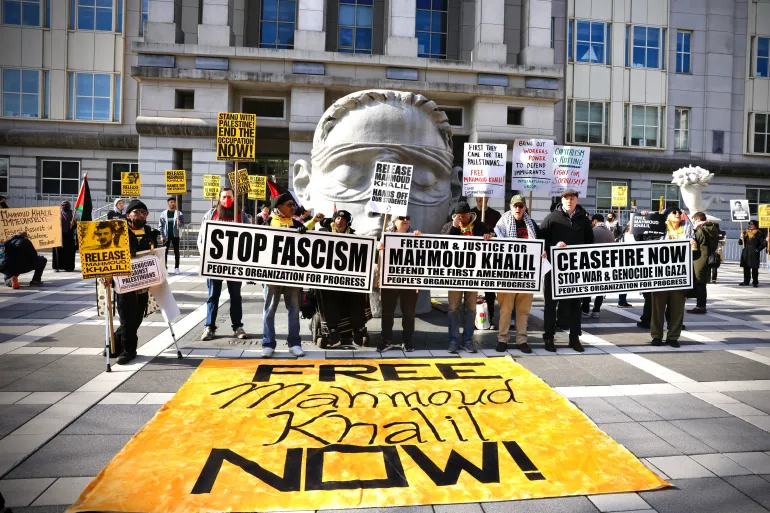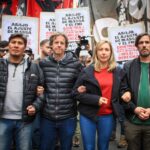
Experts say there are parallels between attempts to expel pro-Palestinian student protesters and Bush era deportations.
When Asad Dandia received a message from a young man named Shamiur Rahman in March 2012, he had no reason to suspect that he was under the watchful eye of state surveillance.
Rahman simply seemed interested in deepening his relationship with Islam and engaging in charity work. As an organizer of the Muslim community in New York City, Dandia was happy to help.
The young man quickly became a frequent attendant to meetings, social events and efforts to help low -income members of the community. Rahman even spent a night at Dandia’s family home.
But almost seven months later, Rahman confessed on social networks: he was a disguised informant from the New York Police Department (NYPD).
Dandia ended up with a collective action, claiming that New York City selected Muslim communities for surveillance as part of the wide “war against terror” in the United States.
Four years later, the city made a deal, agreeing with protections against improper investigations into political and religious activities.
But Dandia sees an echo of her experience in current arrests of pro-Palestinian protesting students from abroad.
It is among the activists and experts who have observed a climb of the standards and practices that became central characteristics of the “war against terror” – from unjustified vigilance to the broad use of executive branch.
“What I supported was very similar to what we see the students support today,” Dandia said.
He noted that a lawyer who represented him is now working in the case of Mahmoud Khalil, a student at Columbia University and a permanent resident faces deportation for his pro-Palestinian activism.
President Donald Trump’s government accused Khalil of supporting terrorism, although he has not yet accused him of any crime or disclosed evidence to prove the claim.
Dandia said the belief that Muslim, Arabic, and Immigrant communities are inherently suspicious is the guiding thread among their experiences. “Even if Trump is trying now to be unprecedented, he’s being inspired by longstanding traditions and policies.”
From neighbors to enemies
Scholars and analysts say one of the general lines is the combination of a more rigorous application of immigration laws with a rhetoric focused on national security.
The “war against terror” began largely after the September 11, 2001 attacks, one of which targeted New York City.
In the following days, the government of former President George W. Bush began to hold dozens of immigrants-almost all of Muslim, Arab and southern Asia communities-for alleged ties to terrorism.
The American Immigration Council, a non -profit organization based in Washington, estimates that 1,200 people were arrested in the initial scan. Many were finally deported.
But immigration beats did not result in a single conviction on terrorism accusations. A 2004 report from the American Civil Liberties Union (ACLU) noted that the government, however, announced the deportations as “linked to the September 11 investigation.”
“Almost immediately after September 11, Muslim communities were treated not as New Yorkers who were living the trauma of an attack in their city, but as potential accomplices, witnesses or perpetrators of a subsequent attack,” said Spencer Ackerman, a reporter who covered the war against terror and authors Reign of Terror.
ACLU’s report says that some of the detainees were kept in solitary confinement and could only leave their cells with handcuffs in their hands and legs. Some were kept detained a long time after the Government innovated them from any irregularity.
Medo and ‘Patria’
Nikhil Singh, a history professor at New York University, believes this period of intense fear has made the US look inside in search of enemies, among its own communities.
“The argument that the US was fighting these non -state groups that had no borders began to imply that the fight against these enemies could occur anywhere, including what the Bush administration began to call ‘homeland’,” said Singh.
He stressed that the detention after September 11 exercised a broad view of the Executive Power, in order to justify the lack of due process for alleged suspects of terrorism.
“Much of what is happening now can be tracked so far, when this argument has become normalized that the executive is responsible for keeping the country safe and, for this reason, needs to be able to suspend basic rights and ignore constitutional restrictions.”
Art Eisenberg, Executive Counselor of Aclu’s New York Branch, explained that the history of attacks on immigrant communities for national security reasons goes beyond the “war against terror”.
“The origins of policing, surveillance, and secret work aiming at immigrant groups date back to the early twentieth century. The New York Police Intelligence Department used to be called Red Squad, but before it was called ‘The Italian Squad,” Eisenberg said.
Over time, these operations have become new sources of potential dissent: communists, civil rights activists and black panthers, among others.
But he added that the “war against terror” marked a climb of this segmentation. And these types of actions can have lasting effects on communities.
ACLU notes that, in the years after the attacks of September 11, more than a third of the Pakistani in a Brooklyn neighborhood known as “Little Pakistan” were deported or decided to leave the area.
Later, in 2012, when it was revealed that the authorities were spying on the organization of Dandia, the donations began to scarce, and the mosque where they held meetings told them to gather outside.
No one was accused of crime. But the frightening effect of surveillance has made the organization eventually close its doors, according to Dandia.
“People always ask this question: If you’re not doing anything wrong, why should you worry?” Said Dandia. “But it is the government that is deciding what is right and wrong.”
Increasing attacks
Under the Trump government, critics say that vague allegations of terrorism continue to be used as a pretext for silencing dissent.
In a statement about Khalil’s arrest, the internal security department claimed that his involvement in campus protests against the Israel war in Gaza showed that he was “aligned” with the Palestinian armed group Hamas.
On Wednesday, masked federal agents also kidnapped a 30-year-old Turkish graduate student called Rumeysa Oztur on the street near Tufts University and took her away when she was on her way to dinner.
In this case, the Department of Internal Security also accused Ozturk of participating in “Hamas” activities without offering details.
The US has designated Hamas as a foreign terrorist organization since 1997. US Law prohibits citizens and residents of providing “material support” to such organizations.
But Samuel Moyn, professor of law and history at Yale University, said recent arrests did not reach this limit.
“The scary is that they abandoned the claim to even accuse people of material support to terrorism,” Moyn told Al Jazeera. “They are based on an allegation that these views are in disagreement with US foreign policy.”
Singh pointed out that seemingly arbitrary arrests allow Trump to be based on the legacy of the “war against terror” while pursuing his own goals, including the repression of immigration.
“It’s the immigration agenda crossing the war against terror,” said Singh. “The first involves slowly wearing traditional constitutional rights, while the latter gives it a structure of ample presidential power.”
If not controlled, Ackerman said that an expansive view of presidential power can pave the way for more human rights abuse, even beyond immigrant communities.
“If there is never any accountability for institutionalized abuse, these abuse will continue and intensify,” he said. “This is the lesson not only of the war against terror, but a lot of harmful human history.”
“If the Trump administration can say that what you say, what you post on social networks, what you put on a poster, revert to the benefit of a terrorist entity, then there is really nothing you can do to protect your freedom to say things that people in power disapprove,” he added.
Originally published by Al Jazeera on 28/03/2025
Por Brian Osgood
Source: https://www.ocafezinho.com/2025/03/29/como-a-guerra-contra-o-terror-abriu-caminho-para-as-deportacoes-de-estudantes-nos-eua/

